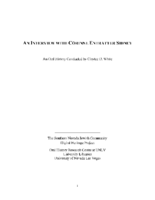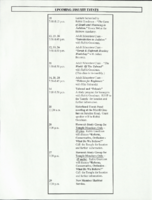Search the Special Collections and Archives Portal
Search Results

Transcript of interview with Jon Sparer by Barbara Tabach, March 4, 2015
Date
Archival Collection
Description
In this interview, Jon Sparer discusses his involvement as the architect of Congregation Ner Tamid's synagogue in Green Valley. He explains details of the building including the concrete tilt-up form, glass windows and the incorporation of quotes throughout the building. Sparer also discusses his involvement with the Gay and Lesbian Community Center of Southern Nevada (The Center) as a board member.
According to architect Jon Sparer, when he moved to Las Vegas in the early 1980s, the art of the deal was still based on a "handshake." It was just after the infamous MGM fire and Jon went to work for Rissman and Rissman. He later worked for Marnell Corrao Associates until 2001, and then as a principal in his own firm. He is now retired. While honing his design skills with the exciting transformation of the Strip into a world-class destination, Jon also became an active contributor to the Las Vegas community. Among his most notable experiences was being on the search committee for a new location for the fast growing Congregation Ner Tamid and then the architectural design for the synagogue's location in Henderson. It was a unique experience and Jon tells how he approached each aspect of the religious facility and how it would provide a memorable setting for life experiences. Jon has been involved with Jewish Family Services and the Anti-Defamation League (ADL). In addition, Jon along with his husband John Klai have been instrumental in the LGBTQ community and the opening of the Gay and Lesbian Community Center of Southern Nevada [The Center]. In this interview, he also talks about the significance of The Center/ and its success in working with the Clark County Health District, as well as providing a user-friendly experience for all who visit The Center and the Bronze Cafe located there.
Text

Transcript of interview with Jerome Countess and Dorothy Eisenberg by Barbara Tabach, October 28, 2014
Date
Archival Collection
Description
Interview with Jerry Countess and Dorothy Eisenberg by Barbara Tabach on October 28, 2014. Countess discusses his childhood and military life. He became involved in the United Jewish Appeal in Las Vegas and started the Jewish Reporter newspaper. Dorothy Eisenberg is also involved in the interview to discuss the Jewish Federation and the Jewish community.
Jerome Countess, known as Jerry to most, was born on December 22, 1920 in Brooklyn, New York. He grew up in the borough's Jewish neighborhood, and he developed a reputation for being a skillful handball player and a great dancer. Though he was not allowed to enlist in the U.S. Coast Guard due to colorblindness, Jerry was eventually drafted into the army during World War II. With very minimal combat training, Jerry was sent to North Africa as an infantryman, and was later stationed in Italy. After three years of service, Jerry returned home and married his childhood sweetheart, Rachel, in 1945. Using the G.I. Bill, he enrolled at New York University to study writing, though he quit just shy of graduation as his wife was expecting. After briefly working in the television broadcasting industry, Jerry landed a job with the United Jewish Appeal. In 1975, following in his desire to move west, Jerry took the job of executive director of the Combined Jewish Appeal in Las Vegas, what would soon be renamed the Jewish Federation of Las Vegas. Under his leadership, the federation started the Jewish Family Service as well as The Jewish Reporter, a monthly publication to promote engagement of the Jewish community. Jerry served as the executive director of the federation for many years, serving at the pleasure of many board members and presidents, including the first female federation president, Dorothy Eisenberg.
Text

Transcript of interview with Corinne Entratter Sidney by Claytee White, June 5, 2007
Date
Archival Collection
Description
Interview with Corinne Entratter Sidney by Claytee White on June 5, 2007. In this interview, Sidney talks about growing up with privilege in California, where her father served as the attorney general. She attended school at UCLA and took acting classes and signed with United Artists. She met Jack Entratter in Los Angeles and moved to Las Vegas and worked as a Copa Girl. She discusses Jack Entratter's generosity and influence in town, and his style, and their lifestyle together. She mentions the likes of Frank Sinatra, Lena Horne and Sammy Davis, Jr. and her extravagant life living at the Sands. After Jack's death in 1971, she moved back to Los Angeles, returned to acting, and wrote a newspaper column. On a visit to Las Vegas with George Sidney after Sidney's wife Jane died, Corinne and George began dating and were married shortly after. They moved back to Las Vegas together for a slower pace. She describes her love of Las Vegas and its continued growth.
Corinne Sidney's life story makes for fascinating reading. She was born in 1937, the daughter of Alice Polk, former Ziegfeld showgirl, and Carl Kegley, an attorney. She attended U. of C. Berkeley, transferred to UCLA, and was spotted by a talent scout who convinced her to enter a Miss USA contest. Corinne's runner-up status in the Miss USA contest led to job offers in acting, so she decided to study acting. This, along with her childhood lessons in ballet, piano, singing, tap dance and horseback riding, led to a contract with United Artists, freelance work, television parts, and plays. Around the age of 18, Corinne met Jack Entratter. Their relationship brought her to Las Vegas, where she worked as a showgirl at the Sands for a few months, and where she married Jack a few years later. They lived a fabulous lifestyle which included travel, beautiful homes, and friendships with noted celebrities. Corinne went back to acting in Los Angeles after Jack passed away, but then segued into writing a gossip column and hosting a television show. She reconnected with an old friend (George Sidney) by writing the obituary for his wife, and within a few months they were married. The Sidney's moved back to Las Vegas, where Corinne still makes her home today.
Text

Minutes from Temple Beth Sholom Board of Directors meetings, 1998
Date
Archival Collection
Description
Meeting minutes include reports from committees of the board, correspondence, and balance sheets.
Text
